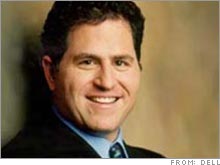Dell gets on the environmental bandwagonMichael Dell and his company will now recycle your computer hardware for free -- even if you're not buying anything new from Dell.NEW YORK (Fortune) -- There was a time when Michael Dell thought consumers didn't care about recycling. That, at least, is what he told shareholder and environmental activists when first they asked him why Dell (the company) would not take back computers that its customers didn't want anymore. It didn't take long for him to change his mind. In 2003, under pressure from the greens, the PC maker held a five-city recycling tour, asking people to bring in their old computers. That they did - on a spring Saturday in Denver, so many people (about 2,000) brought so many old computers (about 200 tons in all) to the parking lot of Mile High Stadium that Dell (Charts) employees worked overtime to load them onto trucks. "We had people there all night," says one. The company immediately added 10 more dates to its recycling tour.
"Maybe the issue should have been on our radar screen well before then but, for whatever reason, it wasn't," Dell told Fortune in a recent interview. Better late than never: Once Dell the CEO and Dell the company tackled the issue of recycling, they began to pursue a green strategy with the fervor of converts. Dell is now the only computer maker to offer consumers free recycling, whether or not they are buying a new Dell product. You can go to a Dell website, and print out a prepaid shipping label to return your Dell desktop, laptop, printer or ink cartridge, free of charge. They'll send a service to pick the equipment up. "In terms of producer takeback, they have the best policy of any global electronics company, period," says Robin Schneider, of the Texas Campaign for the Environment. "They went from being a laggard to being a leader." Schneider once organized protests against Dell because the company briefly used prison labor to recycle its hardware. What turned the company around? Michael Dell cites several factors - consumer demand, the threat of regulation and the recognition that electronic waste, or e-waste, is a significant problem. "If we sell 40 million computers a year, and the industry is going to sell 200 million computers a year, at some point they are going to come out of circulation," he says. "Where do they all go? I want to be in a position where we are doing the right thing." Four states have passed e-waste laws, and bills are pending in another 22 states, so Dell and other computer makers want to get ahead of the issue. "If a regulator ever does show up," Dell says, "we want him to say, hey, you guys are doing the right thing, thank you very much, see you later." When Dell gets computers back, those that can be refurbished (mostly from businesses) are donated to the National Cristina Foundation, which places them with nonprofit groups. The company also has a partnership with Goodwill Industries; many of its stores will take back computers and sort through them, creating jobs and revenue for the organization. Other electronics are sent to recyclers monitored by Dell. Nothing winds up in a landfill, the company says. Those who know him say Michael Dell has developed a strong personal interest in the environment. He chairs a sustainability group inside the company that meets every six weeks or so, frequently prodding his people to do more. Tod Arbogast, director of sustainable business for Dell, says with a laugh: "I'm uniquely advantaged within my industry. Michael really does add passion and enthusiasm." As a result, the company's digging into all things green. Dell is redesigning its computers so that they use less energy; its website includes energy calculators so buyers will know how much electricity some of its products will use. The firm is aggressively cutting energy use (and greenhouse gas emissions) in its own operations. Its marketing publications now use an average of 50 percent recycled content paper, winning praise from the tough-minded activist group Forest Ethics. Two months ago, Dell announced a program called "Plant a Tree for Me" that invites its customers to offset the greenhouse gas emissions caused by the electricity used by their computers; they can add $2 to the price of a laptop or $6 to a desktop, which Dell then sends to conservation groups that offset carbon emissions by planting trees. Insiders tell Fortune that Dell has a bigger climate change project in the works - we'd guess that the company may try to go carbon neutral - but its PR people declined to provide details. Kate Krebs, executive director of the National Recycling Coalition, who has worked with Dell since 2003, gives a lot of the credit to the CEO. "His commitment is a big reason why all this happened, and I honestly believe it's in his heart and soul," she says. Michael Dell told me that he is putting his personal money behind green technology, too, as an investor in alternative energy. He declined to be more specific. When I asked Dell what had sparked his passion for the planet, he was vague at first. He talked about living in Austin (which is more like Madison or Berkeley than the rest of the Lone Star State) and said some friends were involved in environmental causes. Then he mentioned his four children. "I've got a 15-year-old daughter, and she cares about these issues," he said. "And if she cares about these issues, I care about these issues." |
Sponsors
|

